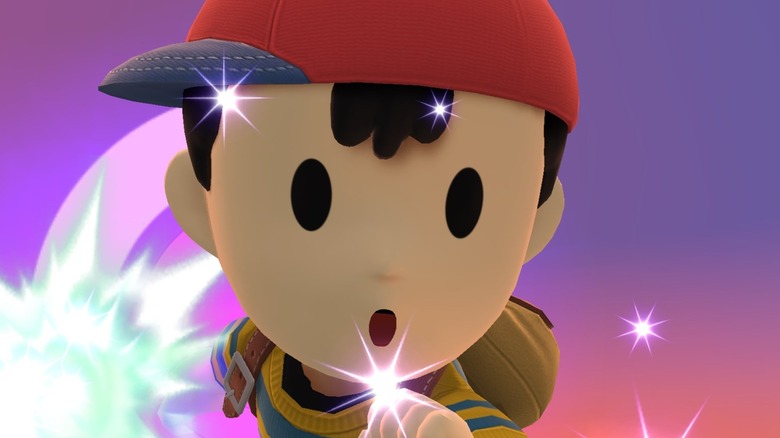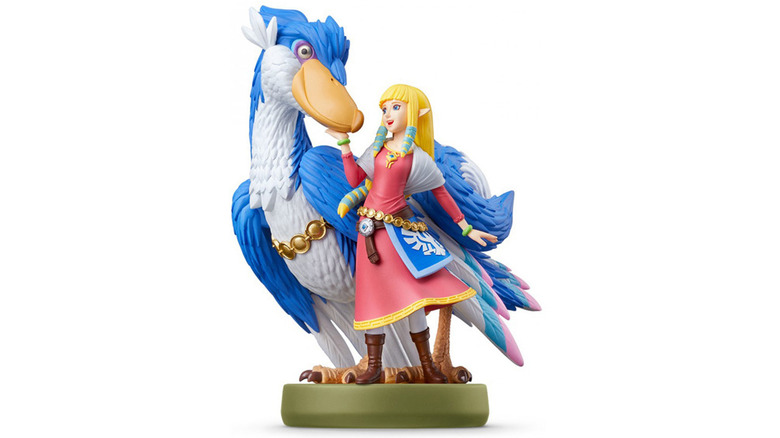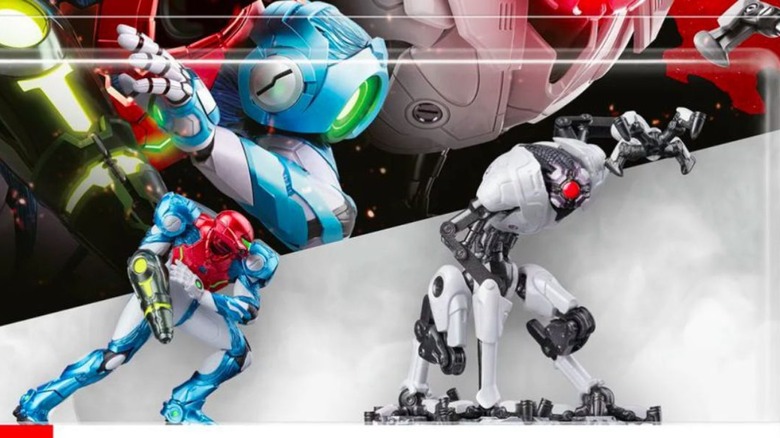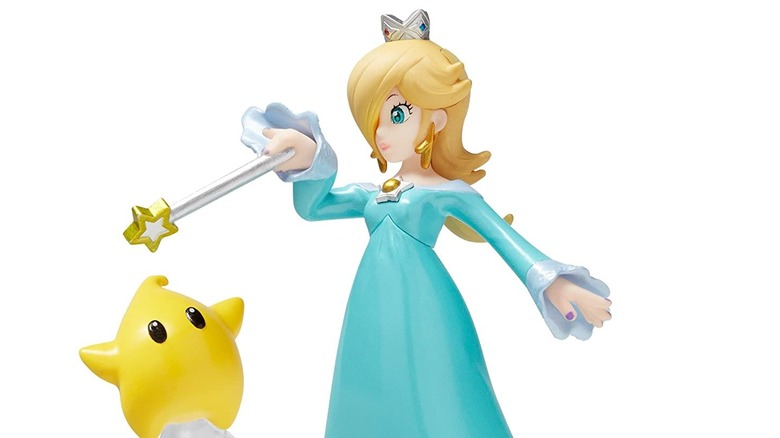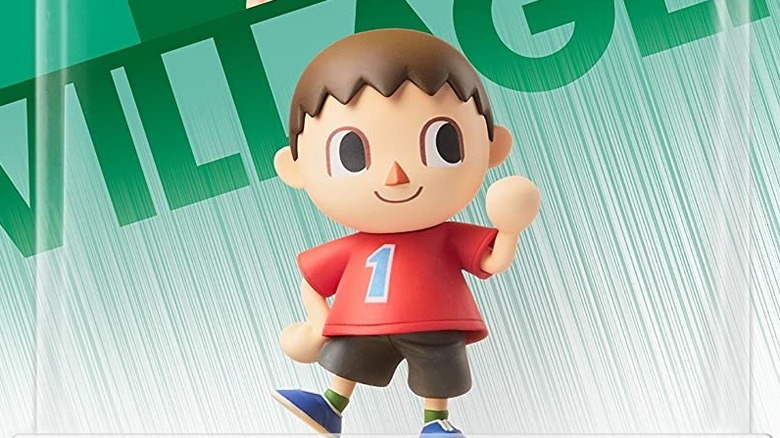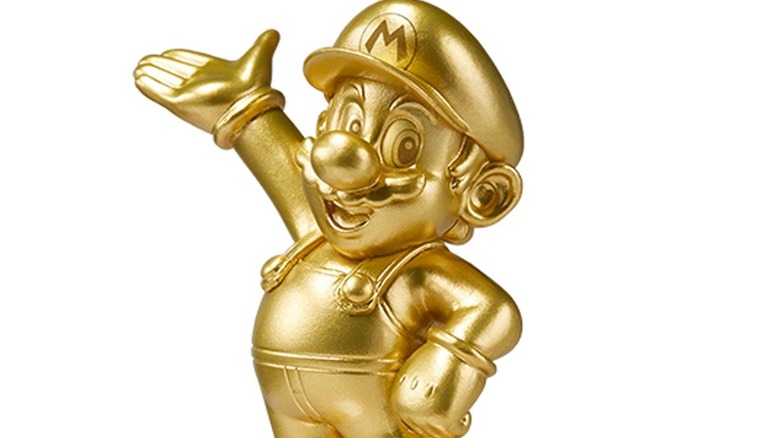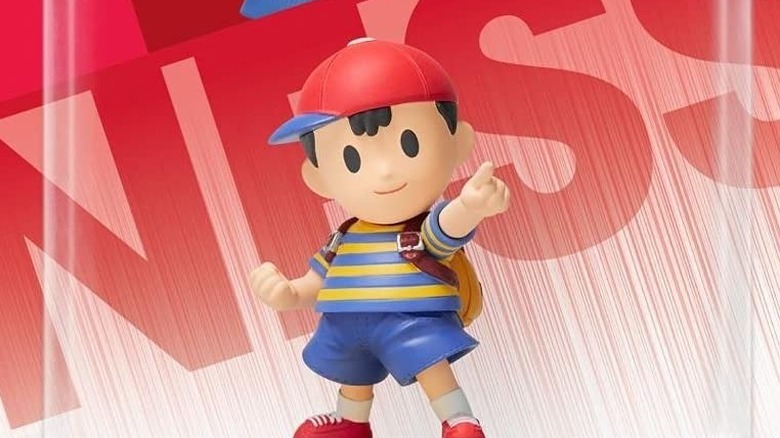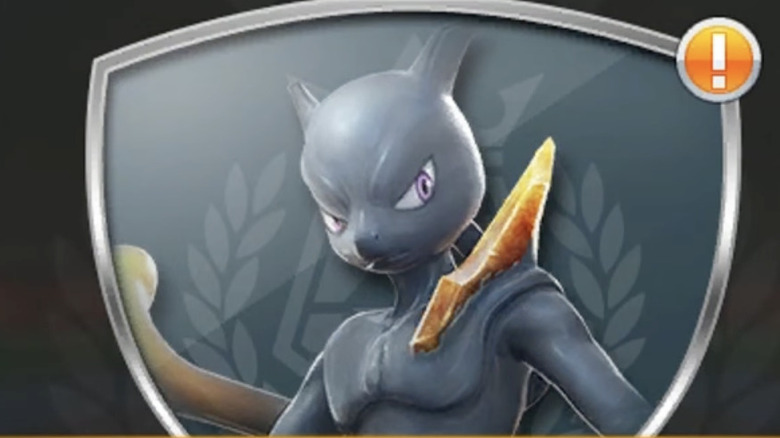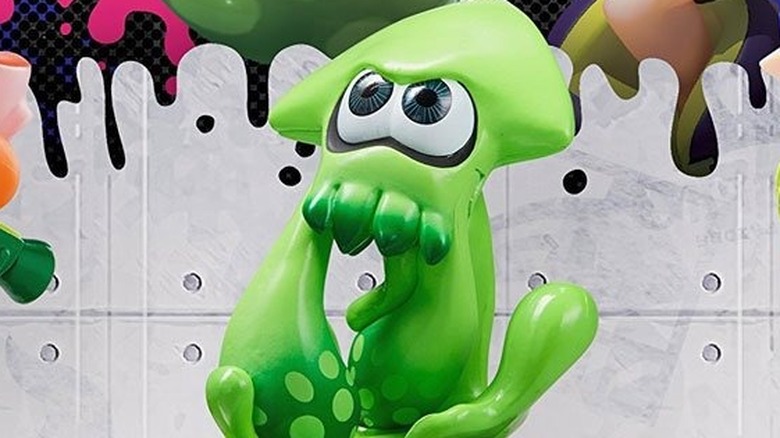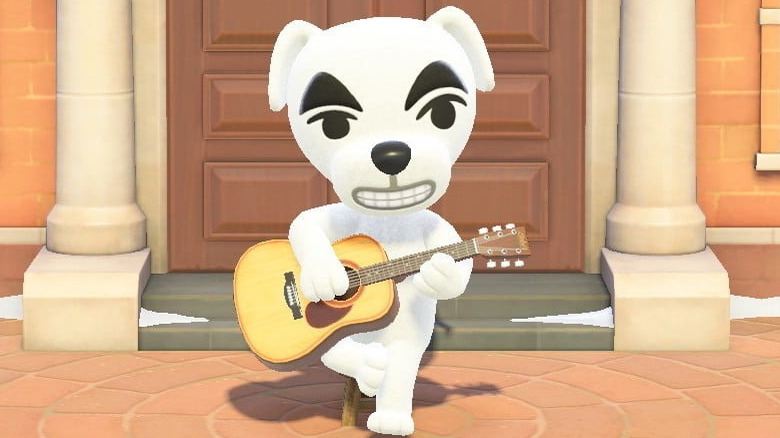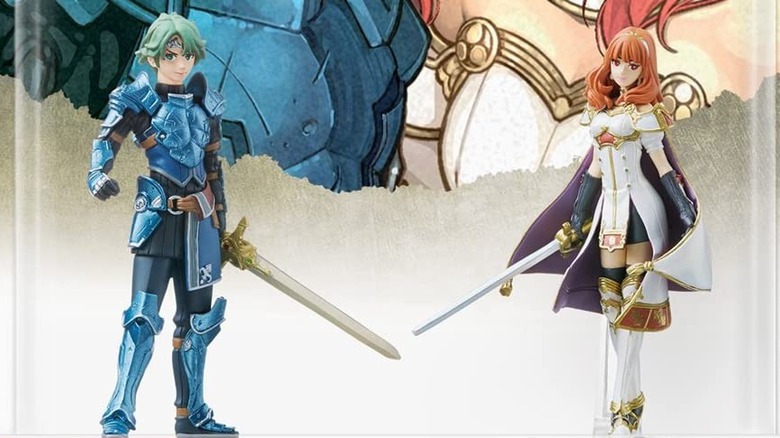Nintendo Amiibo That Caused A Serious Uproar
During E3 2014, Nintendo announced a line of figurines that promised to expand on gameplay and serve as a new type of DLC for popular Wii U and 3DS titles. This line of figures, called amiibo, was modeled after some of Nintendo's most popular characters, including heavy-hitters like Link, Pikachu, Mario, Donkey Kong, Marth, and Kirby. Even more obscure characters like Wii Fit Trainer soon entered the fray, offering Nintendo a range of new gameplay options in the form of collectible figures of fan-favorite characters.
Though the first wave of amiibo figurines were explicitly created for "Super Smash Bros. Wii U," the amiibo line would quickly expand to other titles, including the "Super Mario Bros.," "Pokemon," "Metroid," "Splatoon," and "Animal Crossing" franchises, just to name a few. These little figures were such a hit that production couldn't keep up with consumer demand. Very quickly, these seemingly simple $12.99 toys would spark chaos as fans were unable to secure their favorite amiibo characters and, as reported by USgamer, scalpers sold more elusive amiibo far above retail price.
The figures were advertised as being able to bring games to life, and while they may have done that in some cases, what they also brought was controversy. While collectors and average consumers alike had to rush and clamor to get each of their favorites, some were more problematic than others. Here are the amiibo figures that caused the most uproar.
Zelda and Loftwing Amiibo
Though the release of "The Legend of Zelda: Skyward Sword HD" has been excitedly anticipated by most fans, the $25 Zelda and Loftwing amiibo releasing alongside the title have not received as warm a welcome. In fact, the amiibo has sparked a fair amount of controversy from players and collectors alike, both regarding pricing and gameplay functionality.
So what exactly does the controversial Zelda and Loftwing amiibo do? According to Nintendo's listing for the product, the amiibo allows players to travel quickly between the game's surface and sky worlds. Interestingly, this even applies inside the game's dungeons. During regular gameplay without amiibo, it is only possible to travel between these two worlds at specific save points, making this a definite quality of life improvement in many players' eyes.
Naturally, many fans were upset that the convenience of fast travel was locked behind what could be called a pay-to-play system. Compared to the "Breath of the Wild" amiibo, which added a slew of bonus content like new armor and weapons (via The Verge), fans felt that the Zelda and Loftwing amiibo don't really much add content to the game, but instead locked an important feature behind an additional paywall.
Gameplay aside, the Zelda and Loftwing amiibo are also noticeably higher priced than a regular amiibo. Sitting at $24.99, buying the amiibo and a copy of "Skyward Sword HD" will run you about $85.00. That's a hefty bill to gain access to the game's improved features.
Metroid Dread Amiibo
At E3 2021, Nintendo finally announced a new entry into the long-stagnant "Metroid" series. No, there wasn't anything shown about "Metroid Prime 4." Instead, Nintendo resurrected a dormant project named "Metroid Dread." Now fully formed as a Switch title, Samus Aran's newest adventure was announced alongside a duo of amiibo depicting the new E.M.M.I. enemy and the courageous bounty hunter.
Soon after, the in-game benefits of having the two amiibo were revealed: Samus offers a permanent health boost of 100 points with a daily heal, and E.M.M.I. grants players ten extra missiles alongside a daily refill. Naturally, this is where the controversy began. Considering the fact that the "Metroid" series is built on survival and resource conservations, some fans feel that these perks take away from the game's atmosphere.
On the other hand, the amiibo might also lower the game's difficulty just enough for a player to get through one particularly rough spot, but they're nigh impossible to obtain. As noted by Inverse, part of the reason gamers may not have access to the figures is because of Nintendo's famously small production sizes, resulting in endless storefronts being sold out — unless buyers are willing to pay upwards of $600 on the second-hand market.
Rosalina & Luma
While the amiibo boom may have resulted in some figures achieving the fabled "unicorn" rarity status, the Rosalina and Luma amiibo remains one of the strangest tales in amiibo history. After all, many amiibo can claim popularity, but few have incurred the wrath of devoted haters hellbent on keeping them out of circulation.
Nintendo collector Daily Dose, otherwise known as "Mariotehplumber," had a real vendetta against Rosalina. His apparent solution was to preorder over a hundred Rosalina and Luma toys in the hopes that others couldn't get their hands on her. In a now unavailable interview from the Nintendo Nuggets website (via Destructoid), Daily Dose affirmed his hatred of the character and his goal to keep her out of fans' hands, stating, "I hate her fans, too. I know for a fact her amiibo will be among one of the most popular, which is why I took the time to wait and preorder over 100 of her. I do not want her fans to be happy... It just crushes me Nintendo from the good days went to this s*** for character designs."
Daily Dose apparently dropped $4,000 on preorders and claimed to have spent an additional $35,000 pulling the same stunt with other female amiibo figures. Despite the drama and subsequent internet backlash, as pointed out by Metro, it's unknown whether or not what Daily Dose says is actually true. Still, the story of the man who allegedly bought Rosalina just so others couldn't is still occasionally spoken about as a dark part of amiibo history.
The Villager
The Villager amiibo was released along with the first wave of figurines in 2014. Alongside the likes of popular characters like Pikachu, Link, and Kirby, many opted to leave the (at the time) less popular "Animal Crossing" representative behind on store shelves. Unfortunately for those who did, the Villager would later become one of the most sought-after amiibo figures among collectors, selling upwards of $100 online.
As other figures were restocked, the Villager was seemingly forgotten, making him a nightmare for completionist collectors to get their hands on. But even more frightening, amiibo restocks were not yet guaranteed for hardcore fans who missed out on the first run of their favorite characters. In fact, Nintendo had initially announced (via Wired) that there would be no restocks for some of the less popular amiibo, which made The Villager even more elusive as multiple figures were discontinued.
Eventually, once a restock was announced, The Villager amiibo received a minor design tweak. The eyes had been slightly altered to better match the cutesy style of the games. While this design alteration certainly fits the "Animal Crossing" brand more closely, it also serves to make the first-run amiibo figure all the more valuable among collectors.
Gold and Silver Edition Mario Amiibo
In early 2015, it was revealed that Nintendo would be releasing two special, limited-edition Mario amiibo figures: A Gold Mario and a Silver Mario. The Gold Mario would become the more elusive of the two figures upon release, as it was marked as a Wal-Mart exclusive release, meaning that it immediately sold out and restocks were incredibly slow.
But what's more infuriating than a limited-run, hard-to-find amiibo? An amiibo that is functunally identical to an already released figure. Many fans were becoming disillusioned with the lack of amiibo availability in the United States for specific characters, making collecting a nightmare. These two new Mario figures served as a perfect representation of a money-grab for many fans, as they were essentially just the Mario "Smash Bros." amiibo repainted a different color.
Outside of the silver and gold color variations, no unique gameplay is added by scanning these particular amiibo into the game. When fans weren't busy spending hundreds of dollars to import these figures to the U.S., they were complaining that these figures were just not that interesting, since they didn't add anything major to the gameplay experience.
Ness
During the announcement for the fourth wave of amiibo figures, it was revealed that the Ness amiibo would be a GameStop exclusive. While previous store-exclusive amiibo had caused some scrambling from fans in the past, no one was prepared for the chaos that would ensue when it came to the "Earthbound" protagonist.
Predictably, eager amiibo fans rushed to order the Ness amiibo on GameStop's online system. However, so many people tried to place orders that GameStop's systems completely crashed. According to Uproxx, this system failure didn't just include the GameStop website, but the in-store preorder system, as well as the registers. Not only were people unable to utilize the GameStop website, people were stuck in line unable to complete their preorders at physical GameStops.
Amid the chaos, GameStop released a statement on its website (via Kotaku), which read, "Due to very strong demand for the newest wave of Nintendo's amiibo figures, GameStop is experiencing some technical issues with our website... We are working aggressively to resolve the technical issues as quickly as possible and expect it to be back online shortly."
Eventually, lucky fans claimed their Ness figures, but the preorder phase for Ness created one of the most chaotic days for consumers and retail employees during the peak of the amiibo craze.
Shadow Mewtwo Amiibo Card
Unlike other amiibo on this list, the Shadow Mewtwo amiibo card was a free gift that served as an incentive for players to grab copies of a game earlier rather than later. The card was included first edition copies of the Wii U fighting game, "Pokken Tournament." But despite being technically free of charge, the Shadow Mewtwo amiibo card still managed to ruffle some feathers and cause disruption for "Pokken" players.
Those who grabbed early copies of "Pokken Tournament" and secured the amiibo card would be able to gain access to the fighter, Shadow Mewtwo, right off the bat. As explained by GameSpot, during normal gameplay, Shadow Mewtwo can only be used after completing certain conditions and achievements. However, scanning the card allowed players to access the powerful character immediately, allowing them to effectively dominate online play.
Additionally, it was quickly discovered that Shadow Mewtwo wasn't just powerful, he was broken, capable of performing an infinite attack combo that opponents couldn't block. Ultimately, Shadow Mewtwo lost any sense of reward status by being effectively handed to new players, which gave those with early access to the character an unfair advantage against those who didn't have it from the start.
Splatoon Squid
In 2015, a set of three different "Splatoon" amiibo figures launched, including an Inkling Boy, Inkling Girl, and Squid. These three amiibo figures were naturally combined into a three-pack, which sold for $29.99 (via Polygon). While the Inkling Boy and Inkling Girl were also sold separately as individual figures for the regular $12.99 price tag, in North America, the Squid amiibo could only be obtained by buying the three-pack. This made the Squid the rarest out of the three, and of course, the one that collectors were hunting for. This meant that once the three-pack started to fly off of store shelves, fans had to turn to importing the Squid amiibo from Japan or Europe, where it was actually sold as a stand-alone amiibo.
However, the Squid amiibo became a hot topic in the United Kingdom, as well. Two days before the release of "Splatoon," reports of a U.K. truck transporting Nintento products being hijacked were circulated online. On those trucks were special editions of "Splatoon," which came bundled with the Squid amiibo. Unfortunately, customers who had their particular preordered squid amiibo stolen were not given replacements and instead received a 10 pound discount.
Animal Crossing Amiibo Cards
The release of "Animal Crossing: New Horizons" catapulted the "Animal Crossing" series even further into the mainstream. It's hard to believe, but the series didn't have nearly as large a player base in North America before that. However, the fans that the series did have were vocal.
When "Animal Crossing Amiibo Festival" launched for the Wii U alongside a smattering of amiibo figurines, dedicated "Animal Crossing" lovers were upset that Nintendo opted to tie them to a spin-off — one that's not particularly well-liked — rather than a main series title. That wasn't the only time that amiibo and "Animal Crossing" proved to be a controversial mix.
Coinciding with the release of "Animal Crossing: Happy Home Designer," over 100 amiibo cards went on sale featuring different characters from the "Animal Crossing" series. Initially, these cards allowed players to scan villagers, furniture, and even features into "Happy Home Designer." However, once "New Horizons" launched, they would grow to serve a much more important purpose. As explained by Destructoid, the "New Horizons" amiibo cards became the easiest way to obtain specific villagers. They also became a tool for removing unwanted villagers from a player's island. Naturally, they became a hot commodity, and popular characters sold like hotcakes for far above retail price.
Polygon reported that this trend repeated itself when Nintendo released a new batch of "Animal Crossing" amiibo cards. The "Sanrio" cards, a tie-in with "Hello Kitty," sold out instantly in-stores and were sold for outlandish prices online, making it almost impossible to obtain the cards without buying from scalpers.
Alm and Celica
When the amiibo two-pack of Alm and Celica were announced alongside "Fire Emblem Echoes: Shadows of Valencia," Nintendo Life noted that Amazon Japan's ambiguous wording let fans only speculate about what the amiibo would actually do in their game. As the release date inched closer, it was revealed that the pair would unlock separate dungeons to play through.
Luckily, the dungeons included with the Alm and Celica amiibo were generally well-received from fans of the game. On the flip side, several of the regular, amiibo-less DLC additions to "Shadows of Valencia" were not received with as much enthusiasm, with Kotaku arguing that the game's challenge was nerfed by the introduction of the DLC. As a result, more and more players turned to the amiibo for a more favorable gameplay experience.
As is customary in the amiibo world, the two-pack then became rarer as restocks were slow to roll out. The Alm and Celica amiibo are still regarded as some of the rarer amiibo figures, and they can sell for a pretty penny in the secondary market.

